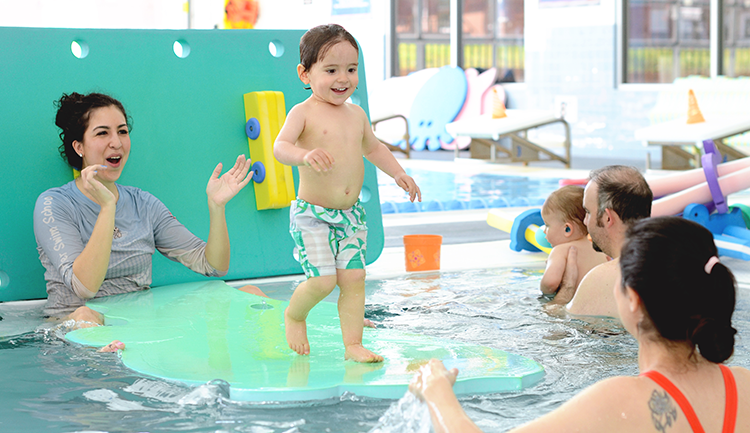
If you have swimmers who are less than exuberant about swimming, taking swimming lessons is actually a very good way to turn their reluctance into excitement.
Lessons are, in fact, the number one way for children who may be nervous around or in the water to become more confident and safe swimmers. Lessons are also very effective as a water safety tool.
Swimming lessons offer a controlled environment with the supervision of trained staff where your reluctant swimmers can relax while learning in a fun setting.
You can bolster the confidence they’re building by reinforcing pro-swim safety at home.
What do lessons do for your little reluctant swimmers?
Swimming lessons integrate weekly visits into your child’s schedule.
It’s pretty simple. Spending more time around whatever it is that makes you nervous or anxious helps you to get over it. Putting your little swimmers in the pool environment on a regular basis familiarizes them with it. Familiarity quells reluctance and puts the foundation for confidence in place.
Swimming lessons open up an opportunity for sharing.
Telling water-related stories and talking about how much fun you had swimming when you were their age also encourages them to in the excitement because they want to be included in the fun.
Swimming lessons reward your swimmers’ milestones.
As your swimmers learn skills, their instructors will recognize their milestones. This is an important part of building reluctant swimmers’ confidence around the water. Your swimmers may put their faces in the water for the first time, or even dunk their entire heads! You can reinforce the recognition your swimmers receive at swimming lessons by congratulating them at home and showing them how proud you are of them for reaching important milestones.
How can you encourage excitement in your little swimmers?
Keep up with your swimmers’ progress by talking to instructors.
Understanding where your swimmers are in the learning process is important to your ability to help them overcome their reluctance. Having knowledge of these details makes your conversations connect with them and shows them that you are really interested in what they are learning. Talking about what they did last week and how much fun they will have next week will help build their excitement about going to their lessons. Help them to get “pumped up” about their next big milestone.
One very important point: Don’t show disappointment if your swimmers don’t meet a goal. Learning should and will move at each swimmer’s pace. Making them feel like a failure will not encourage them to return to lessons and get back in the pool.
Listen to your little swimmers and make sure your responses are encouraging.
Open up your ears to your little swimmers and you will probably hear the answers to your questions about their fears. They will tell you what they’re concerned about, where their anxieties are coming from, and what the little details are that they enjoy.
You will be able to respond with support, with answers and with your own stories that will help them to grow toward anxiety-free swimming!
Don’t add to the pressure they already put on themselves.
Your swimmers know their own anxieties and want to get over them. Pressure from you only adds the pressure of disappointing you to their anxieties. It doesn’t help. It degrades and slows the process. Remember that this is a process individual to each swimmer. You must be patient with them and help them to relax and enjoy the fun of swimming.
Keep the pressure off even after your swimmers start to feel more comfortable around the water. Remember that each swimmer moves at their own pace – regardless of where they are in the learning process. Your patience is a necessity!
Prevent your fears from transferring to your little swimmers.
You may have your own reluctance or anxiousness around the water or you may just lack confidence in your own swimming skills. Keep this to yourself! Don’t let your little swimmers see your fears of lack of confidence because children are imitators. They will mimic your actions and even your attitudes.
It may even help them if you improve your water confidence too.
Help them to own it.
When your little swimmers have their own swimming suit (instead of a hand-me-down from siblings) they feel important and feel more pride in getting it right. Even little things like allowing them to pick out a new pool toy of their very own, new fins or goggles, help them to feel like this is an activity that is meant for them!
Activities that are fun are appealing.
Having fun in the pool is one of the best ways to help reluctant swimmers get over their anxieties. Swimming and learning to swim should be fun. And when anxieties are relaxed, it will be for your little swimmers.
Attitude has everything to do with how little swimmers learn. Excitement for what they are learning creates the engagement that helps children make progress. Swimming instructors agree that it is helpful for parents to “prepare” their children for taking swimming lessons.
Little Otter Swim School’s team members are passionate about teaching kids to swim and be safe as they enjoy the water. Learn more about what makes Little Otter different.


Conversations